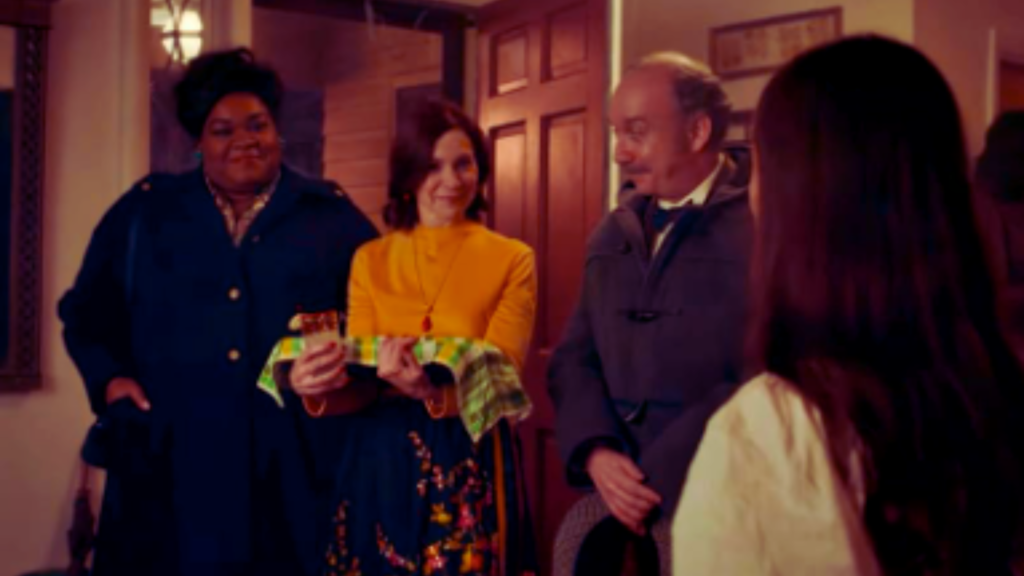Introduction
As families increasingly seek entertaining and appropriate films, understanding the content of movies like The Holdovers becomes crucial. This film, directed by Alexander Payne, combines comedy and drama elements in a unique narrative. This extensive guide provides:
- A thorough overview of The Holdovers.
- Detailing its plot, themes, content, and suitability for various age groups.
- Ensuring that parents are well-informed before introducing it to their families.
Introduction to The Holdovers
The Holdovers is a film that weaves together humour and heartfelt drama, set against the backdrop of a prestigious boarding school during the holiday season. Directed by Alexander Payne, known for blending comedic and dramatic elements, the film explores the lives of characters who find themselves alone at school over the holidays. This guide delves into the film’s content, themes, and suitability for different age groups, helping parents make informed decisions about family viewing.
Plot Overview
The story of The Holdovers revolves around a group of individuals who remain at a boarding
school while others go home for the holidays. This unusual scenario sets the stage for comedic and dramatic moments as the characters interact and navigate their issues. The film focuses on the evolving relationships among the characters, their personal growth, and the surprising connections they form during this period.

Director and Cast
- Director Alexander Payne is known for his thought-provoking films like Sideways and The Descendants. His directorial style in The Holdovers is marked by a nuanced approach to storytelling, blending humour with deeper emotional themes.
- Cast: The film features a talented ensemble cast, including actors who bring depth and authenticity to their roles. Their performances contribute significantly to the film’s impact and viewer engagement.
Detailed Content Analysis
To assess the appropriateness of The Holdovers for various audiences, it’s essential to examine its content in detail. This analysis covers themes, language, violence, sexual content, and other relevant aspects.
Themes
The themes explored in The Holdovers are central to its narrative and can influence its suitability for different age groups:
- Isolation and Community: One of the key themes is isolation, as the characters are left behind at the boarding school. The film examines how these individuals form a makeshift community and find solace in each other’s company.
- Personal Growth: The journey of personal growth is a significant theme, with characters transforming as they confront their issues and build relationships with others.
- Humour and Drama: The film balances humour with drama, creating a rich tapestry of emotions. The comedic elements often lighten the more intense moments, providing a well-rounded viewing experience.
Language and Dialogue
Language and dialogue play a crucial role in the film’s overall tone and appropriateness:
- Mature Language: The Holdovers includes some mature language, which may not be suitable for younger audiences. Strong language is typically contextual and contributes to character development and narrative progression.
- Complex Conversations: The dialogue features complex conversations that may require a certain level of maturity to fully understand. This aspect may be challenging for younger viewers who may not yet have the life experience to grasp the subtleties.

Violence and Conflict
Understanding the nature of conflict and violence in the film is important for evaluating its suitability:
- Moderate Conflict: The film contains moderate conflict between characters, which is more emotional and psychological than physical. This type of conflict contributes to character development and story progression without being overly graphic.
- Emotional Intensity: The film’s emotional intensity may be significant for younger viewers. Parents should consider their child’s sensitivity to emotional content and whether they can handle the film’s deeper themes.
Sexual Content
Sexual content is another critical aspect to consider:
- Subtle References: The film may include subtle references to romantic or sexual relationships. These references are generally non-explicit and serve to advance character development rather than being the focus of the film.
- Romantic Elements: While there are romantic elements, they are woven into the broader narrative. The depiction is handled subtly and not central to the film’s main themes.
Drug and Alcohol Use
The portrayal of drug and alcohol use is also relevant:
- Minimal Depictions: The film features minimal depictions of drug and alcohol use. When these elements are present, they are portrayed in a realistic manner that does not glorify substance use.
- Contextual Use: Any use of substances is contextual and serves the story rather than being gratuitous. This approach helps in maintaining the film’s overall tone and message.
Age Appropriateness
Evaluating the film’s appropriateness for different age groups involves considering its themes, content, and overall emotional impact:
For Younger Children (Ages 6-12)
- Content Suitability: The Holdovers may be challenging for younger children due to its mature themes and emotional depth. The film’s humour and drama might not resonate with this age group, making it less suitable for younger viewers.
- Alternative Options: For younger audiences, it is advisable to consider films that offer simpler narratives and content specifically designed for their age group. Animated films or family-friendly comedies are often better suited for younger children.
For Teenagers (Ages 13-17)
- Content Relevance: Teenagers may find The Holdovers more relatable, particularly with its personal growth and community themes. The film’s mature language and emotional intensity can be appropriate for older teens who can handle complex narratives.
- Parental Guidance: Parents should provide guidance and context when teenagers watch the film. Discussing the film’s themes, characters, and emotional elements can help teens better understand and appreciate the content.
For Adults
- Full Appreciation: Adults will likely fully appreciate the film’s nuanced themes, character development, and balance of humour and drama. The mature content and emotional depth are well-suited for adult viewers who can engage with the film’s complexities.
- Discussion Points: Adults can use the film as a basis for discussions about its themes, character arcs, and societal reflections. It can lead to meaningful conversations and deeper insights into the film’s message.

Viewer Reactions and Reviews
Examining how Critics and audiences have received the Holdovers can provide additional context:
Critical Reception
- Positive Reviews: Critics have praised the film for its engaging storytelling and strong performances. The balance between humour and drama has been highlighted as a significant strength of the film.
- Awards and Nominations: The film’s critical acclaim may include awards and nominations, reflecting its impact and quality within the film industry.
Audience Reactions
- Viewer Feedback: Audience reactions vary, with some viewers appreciating the film’s depth and character development, while others may find it challenging. Reading reviews and audience feedback can offer additional perspectives on the film’s reception.
- Family Experiences: Families who have watched The Holdovers may share their experiences and opinions, providing further insights into its suitability for different age groups.
Tips for Parents
Parents can use the following tips to make informed decisions about The Holdovers for family viewing:
Pre-Screen the Film
- Watch Before Viewing: Parents should watch the film before introducing it to their children. It helps assess the content and determine if it aligns with family values and viewing guidelines.
- Read Reviews: Reviewing critical and audience feedback can provide a broader perspective on the film’s themes and appropriateness. It can help parents make a more informed decision.
Discuss Content with Children
- Prepare for Discussions: Be prepared to discuss the film’s themes and content with your children. Providing context and addressing questions can enhance their understanding and engagement with the film.
- Set Expectations: Set expectations about the film’s content to help children approach it with a mature perspective. Discussing the film’s themes in advance can help prepare them for what to expect.
Consider Alternative Films
- Age-Appropriate Choices: Younger viewers should consider alternative films more suitable for their age. Many films for different age groups offer valuable lessons and entertainment without mature content.
- Educational Options: Look for films that provide educational value and positive messages. Educational films can be entertaining and informative, making them a great choice for family viewing.
Conclusion
The Holdovers film combines humour and drama to explore complex themes through a unique narrative. Its mature content, including language, emotional intensity, and subtle references, makes it important for parents to carefully consider its suitability for their children. Parents can decide whether The Holdovers aligns with their family’s viewing preferences and guidelines by understanding the film’s themes, content, and viewer reactions.
The Holdovers offers a thought-provoking and engaging experience for teenagers and adults with its well-crafted story and character development. Parents can enhance the viewing experience by providing context, discussing themes, and ensuring the film aligns with their values and expectations. Alternative films with more suitable content may be better for younger children, ensuring that family viewing remains enjoyable and age-appropriate.

